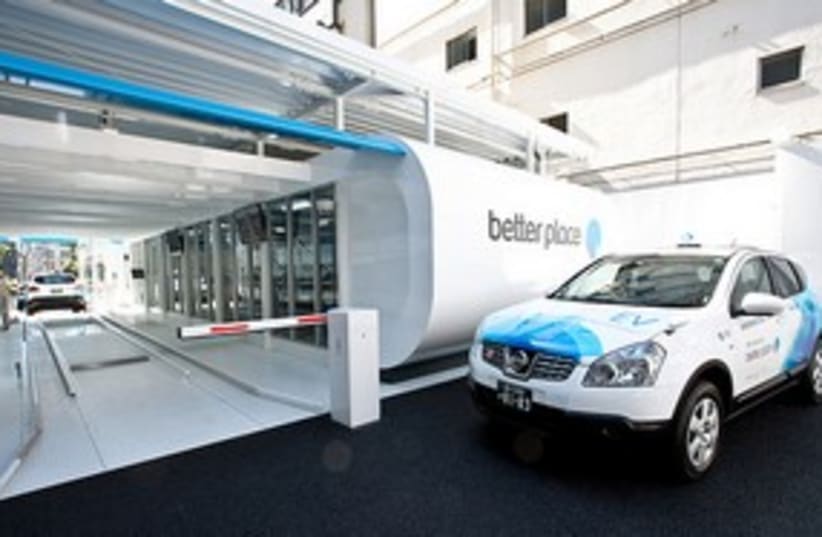RELATED:Officers’ training center to be flagship ‘green’ baseTake a deep breath: Air pollution is on the way downWhile Better Place’s full infrastructure will consist of charge spots and battery switch stations, taxis cannot idle for hours recharging their batteries. Therefore, the taxi fleet will utilize four battery switch stations to keep it on the go.Battery switch stations are like gas stations for electric cars. The driver rolls onto a platform, where the battery is removed by an automated robotic system and replaced with a new one. Better Place’s station can switch a battery in just over a minute – shorter than the time it takes to refuel an internal combustion car.Better Place’s taxi program in Tokyo, supported by the Japanese government, began on April 26, in cooperation with Nihon Kotsu Co., Tokyo’s largest taxi operator. In the first 90 days of the trial, the EV taxis drove over 25,000 miles using battery switch as the primary means of “instant charge” or range-extension.The program focuses on the feasibility of an automated battery switch process as a means for taxis to have instant, zero-emission range-extension, the company said.“Today marks a significant milestone in our march toward accelerating the mass adoption of electric cars in the Bay Area,” said Jason Wolf, vice president of North America for Better Place. “This program will enable us to reach a broad audience and demonstrate a solution that offers drivers a more convenient option than today’s gasoline cars.”According to Wolf, “the battery switch model is gaining momentum globally. Our Tokyo EV taxi program has proven to be an example to major metropolitan areas around the world, and we are pleased that the Metropolitan Transportation Commission recognized this and the Bay Area is taking a leadership position in the US.”The taxi program is supported by both local and state agencies as well as private organizations.Better Place also said it was on track to deploy commercially in Israel and Denmark by late 2011. It will begin its deployment in Canberra, Australia, at the same time, the company said.
Better Place to bring electric taxis to San Francisco area
Full infrastructure will consist of charge spots and battery switch stations; deployment in Israel on track for late 2011.

RELATED:Officers’ training center to be flagship ‘green’ baseTake a deep breath: Air pollution is on the way downWhile Better Place’s full infrastructure will consist of charge spots and battery switch stations, taxis cannot idle for hours recharging their batteries. Therefore, the taxi fleet will utilize four battery switch stations to keep it on the go.Battery switch stations are like gas stations for electric cars. The driver rolls onto a platform, where the battery is removed by an automated robotic system and replaced with a new one. Better Place’s station can switch a battery in just over a minute – shorter than the time it takes to refuel an internal combustion car.Better Place’s taxi program in Tokyo, supported by the Japanese government, began on April 26, in cooperation with Nihon Kotsu Co., Tokyo’s largest taxi operator. In the first 90 days of the trial, the EV taxis drove over 25,000 miles using battery switch as the primary means of “instant charge” or range-extension.The program focuses on the feasibility of an automated battery switch process as a means for taxis to have instant, zero-emission range-extension, the company said.“Today marks a significant milestone in our march toward accelerating the mass adoption of electric cars in the Bay Area,” said Jason Wolf, vice president of North America for Better Place. “This program will enable us to reach a broad audience and demonstrate a solution that offers drivers a more convenient option than today’s gasoline cars.”According to Wolf, “the battery switch model is gaining momentum globally. Our Tokyo EV taxi program has proven to be an example to major metropolitan areas around the world, and we are pleased that the Metropolitan Transportation Commission recognized this and the Bay Area is taking a leadership position in the US.”The taxi program is supported by both local and state agencies as well as private organizations.Better Place also said it was on track to deploy commercially in Israel and Denmark by late 2011. It will begin its deployment in Canberra, Australia, at the same time, the company said.